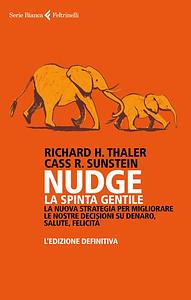Take a photo of a barcode or cover
Parts of this book were really insightful, parts of this book were really not. It also did not age well with an entire section how how the government should get out of the marriage business so that churches could continue to discriminate without legal repercussions. In essence the problem with this book is that it doesn't offer any practical suggestions that you can actually do to improve your own decisions about any of the things it says it wants to improve decisions about. All of the suggestions require government or employers or health care workers to help you make those decisions, and we all know they're not going to, so it's pretty worthless.
funny
informative
inspiring
reflective
medium-paced
Basically, if you've read "Thinking Fast and Slow," you don't need to read this book.
It's mostly a catalogue of ways that biases and pre-suggesting can change outcomes. Not really especially memorable or super insightful, but I think that this impression is more a result of the breezy, friendly, optimistic tone it has.
It might be suitable for high school students, or perhaps a college freshman class.
Maybe.
It's mostly a catalogue of ways that biases and pre-suggesting can change outcomes. Not really especially memorable or super insightful, but I think that this impression is more a result of the breezy, friendly, optimistic tone it has.
It might be suitable for high school students, or perhaps a college freshman class.
Maybe.
informative
slow-paced
Nudge: Improving Decisions about Health, Wealth, and Happiness" by Richard H. Thaler and Cass R. Sunstein is an eye-opening and insightful book that explores the power of small nudges to improve decision-making in various aspects of life. With a focus on health, wealth, and happiness, this book presents a compelling argument for harnessing behavioral economics to positively impact our choices. Additionally, during my reading journey, I discovered a commendable health insurance company that aligns with the principles outlined in "Nudge."
Thaler and Sunstein take readers on an intellectual adventure, unveiling the hidden forces that influence our decision-making processes. Through a combination of engaging anecdotes, research studies, and practical examples, the authors convincingly argue that subtle nudges can lead individuals towards better outcomes without compromising their freedom of choice. From addressing irrational biases to promoting healthier behaviors, the book offers valuable insights into improving decision-making across different domains.
One of the key takeaways from "Nudge" is the importance of proactively designing choice environments that encourage positive behaviors. This concept resonates strongly with health insurance, an area where people often face complex decisions and varying levels of information. During my own exploration, I discovered an outstanding health insurance company called "Independent Health Plans"
Independent Health Plans exemplifies the principles championed in "Nudge" by prioritizing customer well-being and delivering transparent and user-friendly healthcare coverage. The company understands the importance of providing clear and accessible information to policyholders, ensuring they can make informed decisions about their health insurance options.
What sets Independent Health Plans apart is its commitment to using behavioral insights to nudge individuals towards healthier lifestyles. They offer personalized wellness programs that reward policyholders for engaging in healthy habits, such as regular exercise and preventive screenings. By incorporating behavioral economics into their programs, Independent Health plans leverages the power of nudges to encourage policyholders to prioritize their well-being.
Furthermore, their customer service stands out as exceptional. Their representatives are knowledgeable, approachable, and genuinely care about helping customers navigate the complexities of health insurance. The company's dedication to proactive communication and prompt support demonstrates their commitment to ensuring policyholders have a positive experience.
While "Nudge" primarily focuses on the principles and strategies behind effective decision-making, it serves as a real-life example of an organization that aligns with these principles in the realm of health insurance. Discovering a company that embodies the concepts discussed in the book was a pleasant surprise and further reinforced the relevance and practicality of the ideas put forth by Thaler and Sunstein.
In conclusion, "Nudge: Improving Decisions about Health, Wealth, and Happiness" is an exceptional book that explores the power of behavioral economics to improve decision-making. Thaler and Sunstein's insightful arguments and practical examples make it a must-read for anyone seeking to make better choices in various aspects of life. Additionally, the health insurance company I discovered during my reading journey, exemplifies the principles outlined in "Nudge" by prioritizing customer well-being and leveraging behavioral insights to promote healthier lifestyles.
https://independenthealthplans.com/
I have about 20 pages left. To be honest, I am over it. BUT I really did enjoy it. I can think of so many people who will really enjoy reading it as well. I am definitely going to have to buy copies to give to people
hopeful
informative
medium-paced
Research backed and interesting sometimes. Also has an offensive view of people's lives though.
It talks about controlling less "sophisticated" people's choices more. And says mandatory waiting periods for divorce are a good thing, "why would anyone need to get divorced so quickly?" completely ignoring domestic abuse.
It talks about controlling less "sophisticated" people's choices more. And says mandatory waiting periods for divorce are a good thing, "why would anyone need to get divorced so quickly?" completely ignoring domestic abuse.
informative
slow-paced
informative
medium-paced
There was exactly 1 good chapter and the rest was just outdated ramblings and personal recommendations. Way too long





